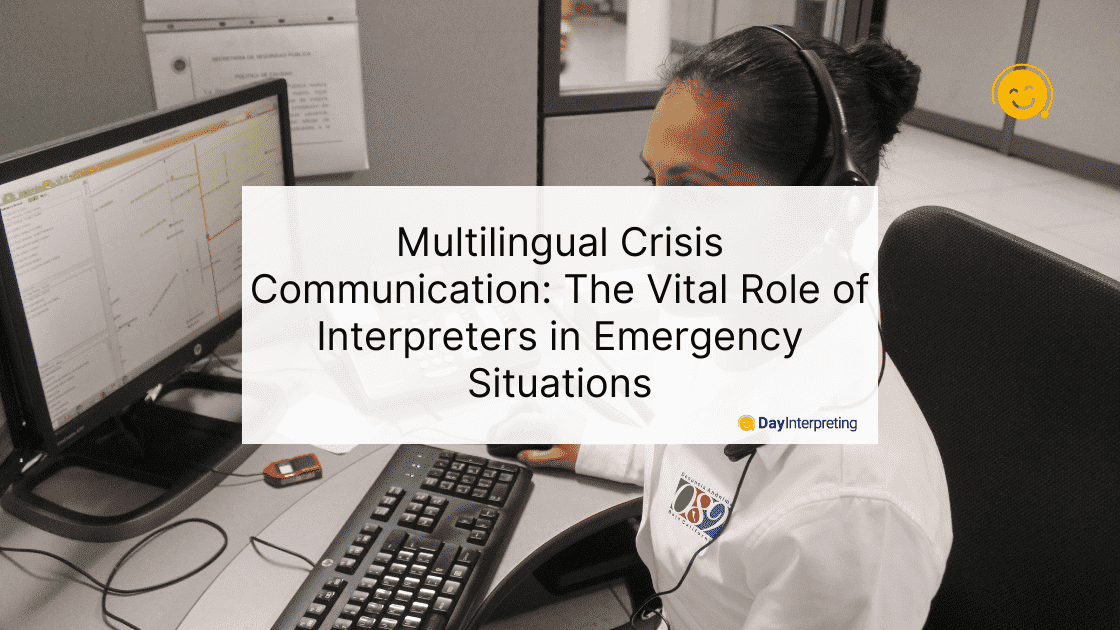Effective communication can mean the difference between life and death in times of crisis. Natural disasters, pandemics, and other emergencies often strike communities where multiple languages are spoken, creating a significant barrier to conveying essential information. This article explores the crucial role of interpreters in emergency situations, highlighting their invaluable contributions in facilitating communication with affected communities, ensuring accurate information dissemination, and ultimately saving lives with multilingual crisis communication.
The Language Barrier in Crisis Communication
During emergencies, affected areas are often populated by diverse linguistic communities. Communicating vital information such as evacuation instructions, medical protocols, and safety guidelines becomes challenging due to language barriers. Interpreters bridge this gap, providing a vital link between authorities and the people they serve.
The Role of Interpreters in Disaster Preparedness and Response
Preparedness
Interpreters play a key role in pre-crisis planning by helping authorities develop multilingual communication strategies. They assist in creating translated materials, language-specific protocols, and training programs to ensure readiness for any eventuality.
On-the-Ground Support
During crises, interpreters work alongside emergency responders, aiding in disseminating real-time information. They assist in coordinating evacuation efforts, providing medical assistance, and ensuring affected individuals comprehend and follow safety instructions.
Interpreters in Public Health Emergencies
Pandemics and Disease Outbreaks
Interpreters convey complex medical information to diverse communities in health crises like pandemics. They help explain symptoms, preventive measures, testing procedures, and vaccination protocols, ensuring everyone can access critical health information.
Mental Health Support
Interpreters also facilitate communication between mental health professionals and individuals suffering from trauma or stress-related disorders. Their services are vital in crisis counseling, therapy sessions, and support group meetings.
Challenges Faced by Interpreters
Emotional Toll
Interpreters often witness firsthand the distressing situations faced by affected individuals. Coping with the emotional burden of interpreting tragic events can lead to burnout, necessitating psychological support.
Limited Resources
Sometimes, resources for interpreter services are limited, hindering effective communication. Adequate funding and training are essential to address this challenge and ensure interpreters can perform their duties optimally.
Cultural Sensitivity and Contextual Understanding
In crisis situations, interpreters must go beyond language proficiency and understand the cultural intricacies of the communities they serve. Cultural nuances and traditions can significantly impact how people respond to and interpret information. For instance, certain communities might have specific rituals or practices during disasters that influence their decision-making. Culturally attuned interpreters can ensure that these practices are respected and integrated into response strategies.
Addressing Cultural Beliefs and Response Strategies
Cultural beliefs often play a central role in crisis response. Some communities may hold spiritual or superstitious beliefs that influence their actions during emergencies. Interpreters who are aware of these beliefs can help authorities adapt their response strategies to align with the cultural context. For example, during a pandemic, some communities may have traditional healing practices that could be incorporated into the overall response plan if interpreters can effectively communicate the benefits and limitations of such practices.
Challenges in Remote and Isolated Areas
In remote and geographically isolated areas, communication during emergencies becomes particularly challenging. These regions often lack the infrastructure for effective communication, such as reliable phone lines or internet connectivity. Interpreters in such areas must cope with these limitations, which can severely hinder their ability to relay information to affected communities and authorities. Remote areas may be difficult to access, especially during or after a disaster. Harsh terrains, damaged roads, and extreme weather conditions can impede interpreters’ mobility, making it challenging to reach the affected population. Discuss the additional logistical hurdles interpreters face in these regions, such as transportation and resource shortages.
The Way Forward: Enhancing Interpreters’ Role in Crisis Communication
Training and Certification
Investing in interpreter training programs and certification processes ensures that interpreters have the necessary skills to handle diverse crisis scenarios.
Technological Solutions
Embracing technology, such as interpretation apps and video conferencing tools, can enhance the reach and effectiveness of interpreter services, especially in remote or disaster-stricken areas.
Community Engagement
Engaging with local communities to identify potential interpreters can help build a pool of linguistic talent within affected regions, ensuring culturally sensitive and accurate communication.
Wrapping Up in Crisis Communication
In multilingual societies, interpreters are unsung heroes during emergencies, acting as lifelines between authorities and affected individuals. Their ability to convey critical information, provide emotional support, and bridge linguistic gaps saves lives and fosters community resilience. Recognizing the vital role of interpreters in crisis communication is paramount, as it paves the way for effective disaster preparedness, response, and recovery, ultimately building stronger, more cohesive societies capable of withstanding the challenges of the future.





0 Comments